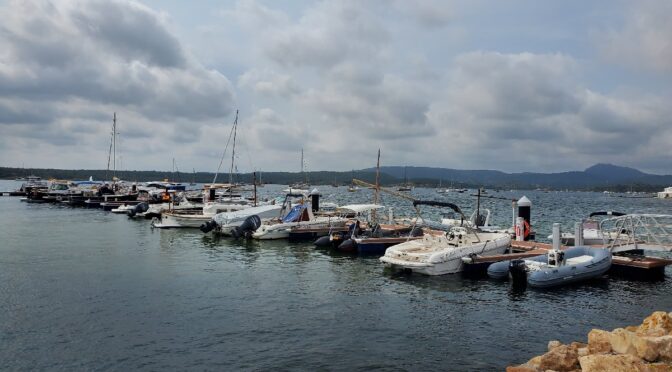Views: 1275
Fornells was recently awarded a black flag by Ecologistas en Acción for the poor management of the bay. GOB Menorca considers this distinction, unfortunately, to be well deserved. For years, we have been repeatedly denouncing environmental violations in the port redevelopment project, carried out by Ports IB, and the situation has now reached a critical point.
The clauses of the awarding contract
The works at the port of Fornells were approved subject to a series of technical conditions. However, from the very beginning, there have been repeated “oversights”. GOB already appealed the awarding of the works in 2021 precisely because numerous environmental requirements had been disregarded—until they were reinstated.
The body responsible for the works, Ports IB, later processed a modification of the environmental assessment in an attempt to eliminate some of the conditions, which are still in force and detailed in this document.
The fact is that when the new nautical facilities were put out to tender and awarded in 2025, the environmental clauses appeared as obligations for the awarded companies. But the activity has started without complying with them.
Specifically, the clauses governing the awarding process state that the L pier cannot be used until documentary proof has been submitted showing compliance with the environmental conditions:
“…the conditions of the environmental procedure do not allow the operation of Pier L (Lot 5) to begin until the Directorate General of Natural Environment and Forest Management has verified the documentary evidence proving the start of the compensatory measures and the implementation of the preventive and corrective measures set out in the resolution of the Plenary of the Environmental Commission of the Balearic Islands on the modification of the Environmental Impact Assessment of the Fornells Port redevelopment project…”
Pending measures
The L pier and the increased number of moorings resulting from the port redevelopment have been in full operation for weeks, but the obligations that should have been fulfilled beforehand remain unmet:
- An annual contribution of €30,000 to the Posidonia Fund, to finance an anchoring surveillance service for the entire protected area (Site of Community Importance Marina Nord Menorca and SCI Punta Redona – Arenal d’en Castell). The increase in boats is already occurring, but there has been neither a financial contribution nor any reinforcement of surveillance.
- Installation of ecological buoys: 8 in Cala Salada, 14 behind the breakwater, and 55 outside the bay. In this case, Ports has made a payment to the Posidonia Fund, but the buoys have not been installed. This means that a higher number of boats is not being accompanied by a higher number of buoys. The environmental authorization imposed this condition to avoid greater risk from uncontrolled anchoring near the port of Fornells.
If these requirements were part of the public tender conditions and are now not being enforced, there could be not only environmental violations but also unfair competition for companies that perhaps did not apply, knowing they would have to assume costs that now appear to be disregarded.
Changing things afterwards
After having carried out the tendering process, Ports IB has again—this is the second time—requested some changes to the conditions that were imposed when the port redevelopment project was approved.
For example, among the clauses governing the awarding of concessions, it was stipulated that all floating pontoons had to be removed during winter. Now that they are installed, Ports is requesting that this requirement be dropped. Once again, this could represent unfair competition for companies that may not have applied because they could not afford to remove the pontoons each year.
Similarly, Ports is asking to revise the payment for surveillance in the bay and to clarify whether the works will be carried out using funds from the Posidonia Fund.
Meanwhile, the pontoons are full of boats, but there is neither more surveillance nor more buoys to prevent anchoring.

